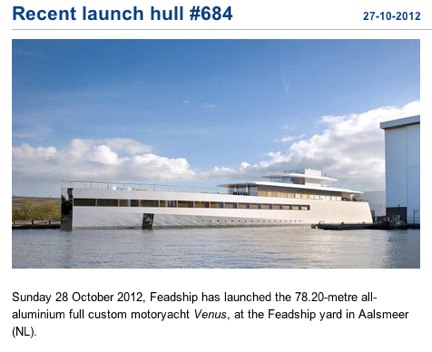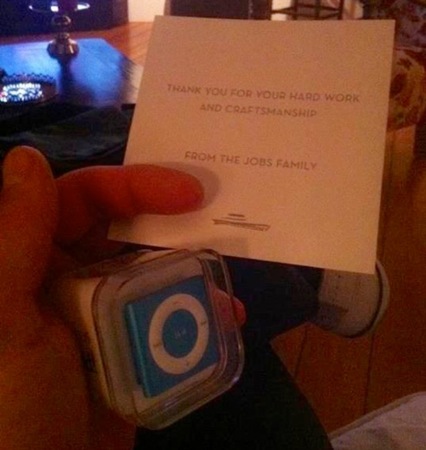Steve Jobs’s yacht, Venus, now launched
15 Nov 2012 | in Steve Jobs news, Updates/Announcements
“There’s no yacht in my future,” Steve Jobs declared to NY Times journalist John Markoff in November 1995, to illustrate his goal in life was not to make money. Had he not died last year, this phrase would be filed among the many contradictory statements Jobs made throughout his life —because two weeks ago, the yacht he spent the last years of his life designing finally launched. I just added a dedicated page about this boat under Steve’s Places (where it best fits, with the private jet).
We first heard about the Jobs yacht last year, when the Isaacson biography was published. It remained a mystery to me since then, especially because of my particular interest in ship design (albeit bigger ones) —but I somehow didn’t expect it to ever be revealed. I thought it would remain in the private sphere of the Jobs family, if it was finished at all. But the resolve of Laurene Powell-Jobs and the voyeurism of today’s media got the better of me, as the yacht (Hull #684) was launched very publicly on October 28 2012. The Feadship shipyard, where the boat was built, even released a note about it on their website (without mentioning the owner’s identity, though; but the rows of iMacs in the bridge leave little doubt about that).

The press release on Feadship’s website
The Venus —as she is named, after the Roman goddess born from the foam of Uranus’s genitals dropped into the sea (Wikipedia confirms)— is indeed very Jobsian in her aesthetics. The very clear-cut lines of her hull, the minimalist superstructure with its right angles and floor to ceiling windows, the lack of any visible mooring or radio equipment… all make for a surprising design that evokes more a floating modernist house than your typical billionaire yacht. Compare and contrast, for example, with Larry Ellison’s latest yacht, Musashi, which is way more traditional —and whose design Jobs supposedly hated (according to Isaacson) which inspired him to create his own, perfect ship.

The Jobses on a cruise in the Corinth Canal, circa 2006
Isaacson writes:
Before his liver transplant, he and his family used to rent a boat for vacations, traveling to Mexico, the South Pacific, or the Mediterranean. On many of these cruises, Jobs got bored or began to hate the design of the boat, so they would cut the trip short and fly to Kona Village. But sometimes the cruise worked well. “The best vacation I’ve ever been on was when we went down the coast of Italy, then to Athens—which is a pit, but the Parthenon is mind-blowing—and then to Ephesus in Turkey, where they have these ancient public lavatories in marble with a place in the middle for musicians to serenade.” […]
After the joy of that cruise, Jobs had amused himself by beginning to design, and then repeatedly redesigning, a boat he said he wanted to build someday. When he got sick again in 2009, he almost canceled the project. “I didn’t think I would be alive when it got done,” he recalled. “But that made me so sad, and I decided that working on the design was fun to do, and maybe I have a shot at being alive when it’s done. If I stop work on the boat and then I make it alive for another two years, I would be really pissed. So I’ve kept going.”
After our omelets at the café, we went back to his house and he showed me all of the models and architectural drawings. As expected, the planned yacht was sleek and minimalist. The teak decks were perfectly flat and unblemished by any accoutrements. As at an Apple store, the cabin windows were large panes, almost floor to ceiling, and the main living area was designed to have walls of glass that were forty feet long and ten feet high. He had gotten the chief engineer of the Apple stores to design a special glass that was able to provide structural support.
By then the boat was under construction by the Dutch custom yacht builders Feadship, but Jobs was still fiddling with the design. “I know that it’s possible I will die and leave Laurene with a half-built boat,” he said. “But I have to keep going on it. If I don’t, it’s an admission that I’m about to die.”
The scenes described by Isaacson lets my imagination run wild. Can you imagine being shown models and drawings of the yacht of Steve Jobs’s dreams… by the man himself? It reminds me of the famed models of a hypothetical modern house for Woodside, dating back from the late 1980s, but which never materialized. It seems that the prospect of a nearing death must have pushed the Apple CEO to stop refining (some would say procrastinating) and actually turn his plans into reality. I find it interesting that he chose to spend the limited time he had on the yacht (and the Apple Spaceship) rather than his family home. Perhaps it is because of the greater liberty and challenge that is peculiar to naval architecture; a ship is its own universe, it must be self-sufficient when on water. Not so with a house. Or perhaps it was only because he could see the Woodside teardown taking too long to happen, who knows.
This first, exciting yet mysterious reveal was in October 2011, just two weeks after Steve’s passing. But another one came some six months later, when my fellow countryman designer Philippe Starck announced in a radio interview he was working on a “revolutionary” project with Apple that would come out “in eight months”. I assumed he was drunk or suicidal —the former option was probably the most likely, because after Apple denied his claims, he admitted he was in fact working on a personal project with the Jobs family: “I’ve come to visit him once a month for seven years in Palo Alto, and I’m actually going there next Monday, because now that he’s dead, I’m working with his wife. We enjoyed exchanging about interesting things” (translated from the French by yours truly).

French designer Philippe Starck who partook in the Venus design
The anecdote aside, I thought it was another Jobsian move to use the services of Starck. This is because I’ve come to believe the theory laid out by Alan Deutschman in The Second Coming of Steve Jobs, according to which Jobs was insecure about his taste in his personal life (not so much in his work, obviously) and liked to take advice from renown taste makers to shape his own. It’s possible he couldn’t decide when you know he spent the better part of his youth living in empty houses. And it’s also true that he used world-famous architect I. M. Pei’s services to design not only the staircase of the NeXT offices, but also the remodeling of his Manhattan apartment (not that he ever lived there) and supposedly some early projects for Woodside, too. That he would call on Starck for the design of his yacht fits well within this trend.
The last Jobsian touch was actually from the Jobs family —maybe Steve had planned, or maybe Laurene did something she thought he would have done. They sent a thank you note to all the workers of the Feadship yard stating “Thank you for your hard work and craftsmanship – from the Jobs family” with a stylized silhouette of the Venus at the bottom. (The note came with an iPod shuffle which, to be honest, did remind me of one of the earliest Fake Steve Jobs pieces…)

And so it is one year after her reveal, and apparently eight years since her inception, that the Venus starts sailing the seven seas. I really wonder what she will be used for. Will the Jobses actually use it and sail across the globe? Or did Laurene insist on finishing one his husband’s late projects? This might stay secret as it is part of the Jobses private life. But my appetite for more details is really not about that. Indeed, many more questions have sprung in my mind from these first photos of the yacht: what is it like inside? Where and how is the equipment hidden? How does the superstructure hold? How are the navigation computer systems designed? What’s the engine room look like? (I imagine it’s neat knowing Steve’s love for machines)… The mystery of Steve Jobs goes on.